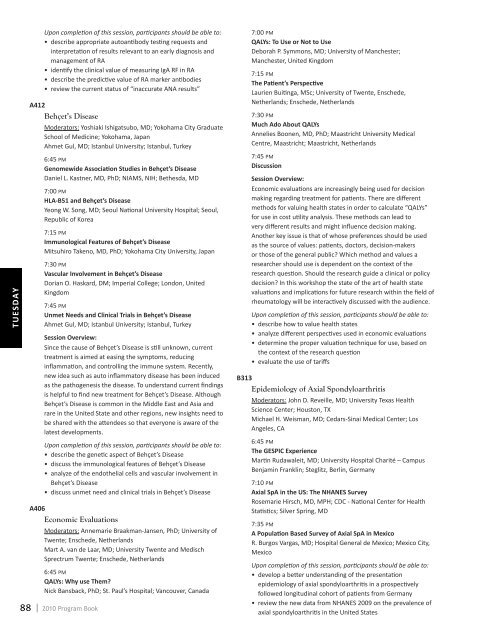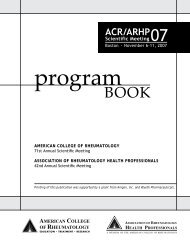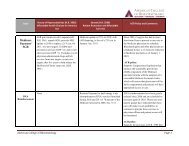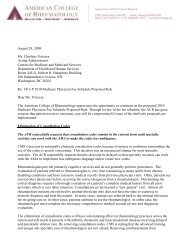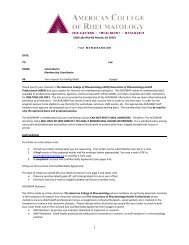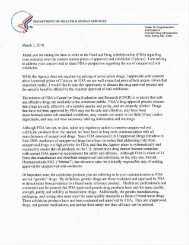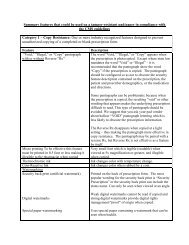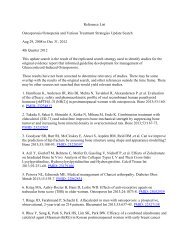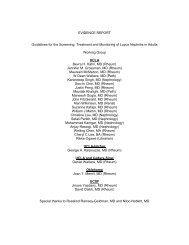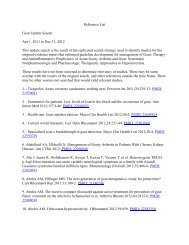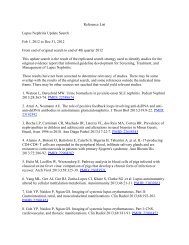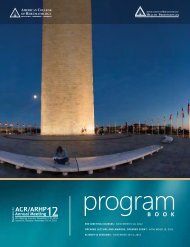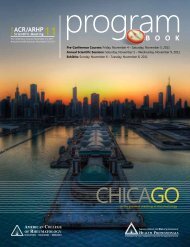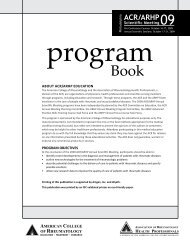B O O K - American College of Rheumatology
B O O K - American College of Rheumatology
B O O K - American College of Rheumatology
Create successful ePaper yourself
Turn your PDF publications into a flip-book with our unique Google optimized e-Paper software.
tuesday<br />
88<br />
Upon completion <strong>of</strong> this session, participants should be able to:<br />
• describe appropriate autoantibody testing requests and<br />
interpretation <strong>of</strong> results relevant to an early diagnosis and<br />
management <strong>of</strong> RA<br />
• identify the clinical value <strong>of</strong> measuring IgA RF in RA<br />
• describe the predictive value <strong>of</strong> RA marker antibodies<br />
• review the current status <strong>of</strong> “inaccurate ANA results”<br />
A412<br />
Behçet’s Disease<br />
Moderators: Yoshiaki Ishigatsubo, MD; Yokohama City Graduate<br />
School <strong>of</strong> Medicine; Yokohama, Japan<br />
Ahmet Gul, MD; Istanbul University; Istanbul, Turkey<br />
6:45 PM<br />
Genomewide Association Studies in Behçet’s Disease<br />
Daniel L. Kastner, MD, PhD; NIAMS, NIH; Bethesda, MD<br />
7:00 PM<br />
HLA-B51 and Behçet’s Disease<br />
Yeong W. Song, MD; Seoul National University Hospital; Seoul,<br />
Republic <strong>of</strong> Korea<br />
7:15 PM<br />
Immunological Features <strong>of</strong> Behçet’s Disease<br />
Mitsuhiro Takeno, MD, PhD; Yokohama City University, Japan<br />
7:30 PM<br />
Vascular Involvement in Behçet’s Disease<br />
Dorian O. Haskard, DM; Imperial <strong>College</strong>; London, United<br />
Kingdom<br />
7:45 PM<br />
Unmet Needs and Clinical Trials in Behçet’s Disease<br />
Ahmet Gul, MD; Istanbul University; Istanbul, Turkey<br />
Session Overview:<br />
Since the cause <strong>of</strong> Behçet’s Disease is still unknown, current<br />
treatment is aimed at easing the symptoms, reducing<br />
inflammation, and controlling the immune system. Recently,<br />
new idea such as auto inflammatory disease has been induced<br />
as the pathogenesis the disease. To understand current findings<br />
is helpful to find new treatment for Behçet’s Disease. Although<br />
Behçet’s Disease is common in the Middle East and Asia and<br />
rare in the United State and other regions, new insights need to<br />
be shared with the attendees so that everyone is aware <strong>of</strong> the<br />
latest developments.<br />
Upon completion <strong>of</strong> this session, participants should be able to:<br />
• describe the genetic aspect <strong>of</strong> Behçet’s Disease<br />
• discuss the immunological features <strong>of</strong> Behçet’s Disease<br />
• analyze <strong>of</strong> the endothelial cells and vascular involvement in<br />
Behçet’s Disease<br />
• discuss unmet need and clinical trials in Behçet’s Disease<br />
A406<br />
Economic Evaluations<br />
Moderators: Annemarie Braakman-Jansen, PhD; University <strong>of</strong><br />
Twente; Enschede, Netherlands<br />
Mart A. van de Laar, MD; University Twente and Medisch<br />
Sprectrum Twente; Enschede, Netherlands<br />
6:45 PM<br />
QALYs: Why use Them?<br />
Nick Bansback, PhD; St. Paul’s Hospital; Vancouver, Canada<br />
2010 Program Book<br />
7:00 PM<br />
QALYs: To Use or Not to Use<br />
Deborah P. Symmons, MD; University <strong>of</strong> Manchester;<br />
Manchester, United Kingdom<br />
7:15 PM<br />
The Patient’s Perspective<br />
Laurien Buitinga, MSc; University <strong>of</strong> Twente, Enschede,<br />
Netherlands; Enschede, Netherlands<br />
7:30 PM<br />
Much Ado About QALYs<br />
Annelies Boonen, MD, PhD; Maastricht University Medical<br />
Centre, Maastricht; Maastricht, Netherlands<br />
7:45 PM<br />
Discussion<br />
Session Overview:<br />
Economic evaluations are increasingly being used for decision<br />
making regarding treatment for patients. There are different<br />
methods for valuing health states in order to calculate “QALYs”<br />
for use in cost utility analysis. These methods can lead to<br />
very different results and might influence decision making.<br />
Another key issue is that <strong>of</strong> whose preferences should be used<br />
as the source <strong>of</strong> values: patients, doctors, decision-makers<br />
or those <strong>of</strong> the general public? Which method and values a<br />
researcher should use is dependent on the context <strong>of</strong> the<br />
research question. Should the research guide a clinical or policy<br />
decision? In this workshop the state <strong>of</strong> the art <strong>of</strong> health state<br />
valuations and implications for future research within the field <strong>of</strong><br />
rheumatology will be interactively discussed with the audience.<br />
Upon completion <strong>of</strong> this session, participants should be able to:<br />
• describe how to value health states<br />
• analyze different perspectives used in economic evaluations<br />
• determine the proper valuation technique for use, based on<br />
the context <strong>of</strong> the research question<br />
• evaluate the use <strong>of</strong> tariffs<br />
B313<br />
Epidemiology <strong>of</strong> Axial Spondyloarthritis<br />
Moderators: John D. Reveille, MD; University Texas Health<br />
Science Center; Houston, TX<br />
Michael H. Weisman, MD; Cedars-Sinai Medical Center; Los<br />
Angeles, CA<br />
6:45 PM<br />
The GESPIC Experience<br />
Martin Rudawaleit, MD; University Hospital Charité – Campus<br />
Benjamin Franklin; Steglitz, Berlin, Germany<br />
7:10 PM<br />
Axial SpA in the US: The NHANES Survey<br />
Rosemarie Hirsch, MD, MPH; CDC - National Center for Health<br />
Statistics; Silver Spring, MD<br />
7:35 PM<br />
A Population Based Survey <strong>of</strong> Axial SpA in Mexico<br />
R. Burgos Vargas, MD; Hospital General de Mexico; Mexico City,<br />
Mexico<br />
Upon completion <strong>of</strong> this session, participants should be able to:<br />
• develop a better understanding <strong>of</strong> the presentation<br />
epidemiology <strong>of</strong> axial spondyloarthritis in a prospectively<br />
followed longitudinal cohort <strong>of</strong> patients from Germany<br />
• review the new data from NHANES 2009 on the prevalence <strong>of</strong><br />
axial spondyloarthritis in the United States


